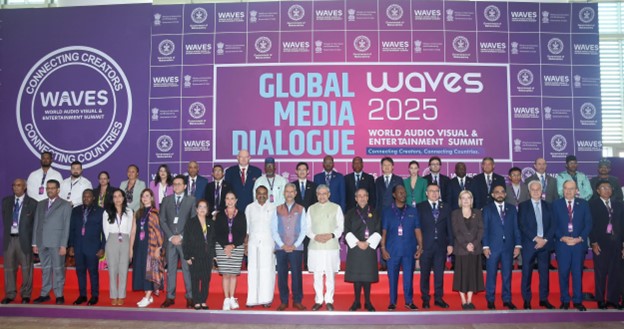Global Media Dialogue at WAVES 2025 in Mumbai offered a hopeful counterpoint—one rooted in creativity, collaboration, and cultural connection. Hosted under the banner of the World Audio Visual and Entertainment Summit, the event brought together delegations from 77 countries to adopt the WAVES Declaration—a shared commitment to preserve heritage, promote ethical innovation, and build a more inclusive global media landscape.
The WAVES Declaration captured the spirit of the summit: a recognition that in an interconnected world, media and entertainment hold the power not only to entertain, but to unite. The document calls on nations to responsibly use emerging technologies, reduce bias in digital systems, and democratize access to content—while prioritizing ethics in an age increasingly shaped by AI.
Much of the dialogue centered on the unifying potential of storytelling, particularly through cinema. Indian films were widely praised for their ability to transcend borders and resonate emotionally with audiences across cultures. Participants acknowledged that storytelling—whether in the form of films, digital content, or immersive media—has become one of the most potent tools for diplomacy and understanding.
External Affairs Minister Dr. S. Jaishankar, addressing the forum, called WAVES 2025 a “microcosm of the global creative community.” He emphasized that the future of global collaboration lies in the ability to blend tradition with innovation. “It is crucial that young talent is made ready for an age of creative collaborations through relevant skill development,” he said, underscoring the need for both technological fluency and cultural literacy.
Dr. Jaishankar also pointed to the dual nature of AI—its immense promise, but also its potential to entrench bias or erode cultural nuance. “Technology must strengthen awareness of our vast heritage, not erase it,” he cautioned, especially as younger generations grow up in algorithm-driven environments.
Echoing this, Minister for Information & Broadcasting Ashwini Vaishnaw laid out a vision of cultural cooperation at scale. In his remarks, he urged the global creative community to invest in co-production treaties, shared content funds, and multilingual distribution pipelines that allow diverse voices to travel far beyond their origins. Creativity, he said, must move along a “global expressway of ideas.”
India also used the occasion to showcase the growing reach of its Create in India Challenge—an initiative that, in its debut season, attracted over 700 creators from around the world. Building on that momentum, the next edition will include challenges in 25 global languages, aiming to surface talent from regions that have historically been underrepresented in global media ecosystems.










